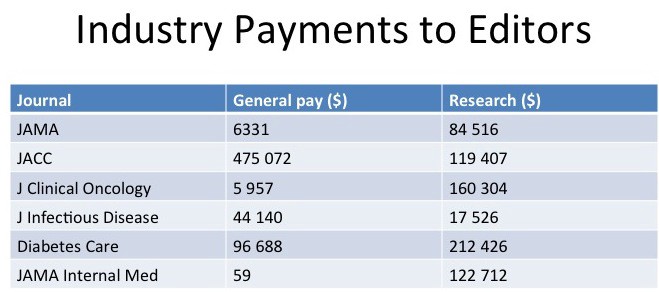This Is The Sickening Amount Pharmaceutical Companies Pay Top Journal Editors
Science Alert
FIONA MACDONALD
12 APR 2018
…
“Most shocking: medical journal editors are paid huge sums by pharmaceutical companies each year.
“This is something most of us already know – we see the sponsored pens and all the fancy conferences doctors go on thanks to ‘big pharma’.
“But that’s only a small part of it. The industry also just hands them money directly.
“A paper published last year in the British Medical Journal examined how much money editors of the world’s most influential medical journals were taking from industry sources.
“Of the journals that could be assessed, 50.6 percent of editors were receiving money from the pharmaceutical industry – in some cases, hundreds of thousands of dollars.
“Here’s just a small highlight showing editor payments received in 2014 – the amount on the left is direct payments, and the ‘research’ payments on the right are less regulated, usually made in the form of expensive research trips.

(Liu et al., BMJ, 2018)
“The average ‘in hand’ payment in 2014 alone was US$27,564, plus research funds.
“Worst on that list is the Journal of the American College of Cardiology (JACC), where 19 of its editors received, on average, US$475,072 personally and another US$119,407 for ‘research’.
“And that’s not even mentioning the amount of reprint money journals get whenever they publish a study that supports a pharmaceutical company, and the company pays for hundreds of copies to send out to doctors.
“The Lancet earns 41 percent of its income from reprints, and the American Medical Association gets 53 percent.
“The medical profession is being bought by the pharmaceutical industry, not only in terms of the practice of medicine, but also in terms of teaching and research,” said the late Arnold Relman, a former editor-in-chief of the New England Journal of Medicine (NEJM) in 2002. He passed away in 2014.
“‘The academic institutions of this country are allowing themselves to be the paid agents of the pharmaceutical industry. I think it’s disgraceful.'”

